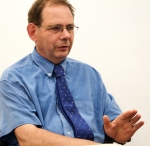Catherine Staite, Director, INLOGOV
This week Teresa May has argued that immigrants bring no benefits to our country – just problems. Its not unusual for politicians to assert things which fly in the face of the evidence but it is unusual to hear something presented as fact which is so demonstrably untrue. Birmingham has provided a home for many different waves of immigrants over the last century and they have helped to create a diverse and vibrant city. Migration is an issue, like many others today, where prejudice trumps evidence.
The latest mass movement of refugees from Syria, Iraq and parts of Africa – fleeing unspeakable violence and oppression – has brought the issue of migration into sharp focus. The sight of so many traumatised people and so many drowned children as well as the terrible stories of cruelty, as a result of which enormously dangerous journeys became the only possible course of action, has made it hard for xenophobes to maintain a fictional narrative in which migrants are opportunists, pootling about the world in search of generous welfare benefits.
Each episode of ‘Who Do You Think You Are’ highlights both the rich diversity of our heritage and the, sometimes astonishing, parallels between previous episodes from history and the current mass movements of people. The programme illustrates the impact of the major upheavals of history through the small stories, the unsung heroism and heartbreaking tragedies of its subjects’ ancestors. It humanizes history.
Until recently, we might have thought that systematic brutality and persecution in the developed world were things of the past. We might have flattered ourselves that, with all the benefits of instant communication and our ability to mobilise resources to respond to emergencies, we would never see such suffering in Europe again – but we are. As was often the case in the past, many of our politicians have turned a cold and indifferent face to that suffering or used it to drive fear. They have been more interested in maintaining their own political careers than in ensuring the safety and well being of their fellow human beings. They have also been wilfully blind to the evidence of the opportunities and benefits that migrants bring, focusing instead on the costs and the risks.
Will a successor programme, in a hundred years time, tell some British national treasure the story of her ancestors, illustrated by a film of defenseless women and children being attacked by pepper spray, through a metal fence, in Europe in 2015? Will that person weep, as so many subjects of the programme do now, when they contemplate so much suffering? What will they think of us, that we allowed it to happen?
Evidence of the benefits of migration include Boris Johnson, who is descended from George III, a German and also has Turkish ancestry. He seems to be making a contribution to public life. Michael Portillo’s family fled oppression in Spain. Say what you like about his politics, he presents a great railway travelogue. Derek Jacobi’s family were Huguenots, fleeing religious persecution in France in the 17th century and bringing their skills as weavers to the English economy. Now we enjoy his skills as an actor. Jane Seymour’s Polish Jewish family suffered in the Warsaw ghetto in the same way that people are suffering now in Homs and Aleppo. We have all those people in our national life today because, at some point, Britain gave their ancestors a home.
However, some might argue that politicians are right to worry about the consequences of migration when you think of the heritage of one recent subject of the programme, Frank Gardiner – so quintessentially English – who discovered that his ancestor had arrived without the proper documents, subverted the local culture by making everyone speak his language and had taken a job previously held by a local. Perhaps he’s the exception that proves the rule. He was William the Conqueror.
Catherine Staite is the Director of INLOGOV. She provides consultancy and facilitation to local authorities and their partners, on a wide range of issues including on improving outcomes, efficiency, partnership working, strategic planning and organisational development, including integration of services and functions.

